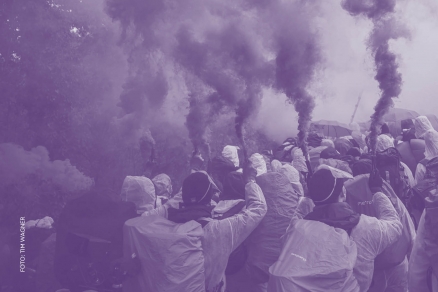
The global crises are now also being felt directly here in Germany. But despite summer heatwaves and deadly floods, despite the shift to the right, growing social inequality and austerity policies the left seems to be paralyzed, inhibited, but above all invisible. Apart from waves of outrage and short-term mobilizations, there are barely enduring protests or resistance. The disorientation and division within the left as a whole contribute to this. The central, underlying causes are the paradoxically power-stabilizing effects of war and crises, which coincide with the impact of neoliberal individualization, from which we, as the radical left, are not immune. The fragmented left finds it increasingly difficult to respond adequately to the acceleration of political events and to develop counter-proposals to the conditions of everyday life.
Colonial exploitation, cheap natural resources and fossil extractivism have made the capitalist centers of the West rich and powerful. This is what made the class compromise in industrialized societies possible after the Second World War; it enabled large sections of society to participate in consumption and prosperity. To this day the imperial mode of living can only be realized in a small part of the world. Its cost is neo-colonial exploitation and the unrestrained consumption of resources and fossil fuels. Of course mainly the rich and wealthy are those who benefit, while social inequality is also growing within the capitalist centers. Many people here perceive changes in these conditions as a threat to their way of life; partly because change under the prevailing power relations does not occur at the expense of the rich, but rather of the majority of the population. This mechanism presents a huge obstacle to broad-based resistance against border regimes, institutional racism and for serious climate policy.
The unignorable moments of escalating crises such as the Ahrtal flood, the coronavirus pandemic or the current wars have paradoxically contributed to the stabilization of existing power relations. By successfully addressing the need for security and stability, social contradictions in these situations could be leveled out in favor of seemingly general interests or clear friend-foe distinctions. The invocation of a community of fate has caught on. Varying degrees of affectedness and responsibility no longer play a role. Spreading crises converge with the accelerated attention economy of the digitalized public sphere. Political debates become increasingly moralized, one wave of outrage follows the other, countless political uproars are strung together at ever shorter intervals. But what is burning today is already forgotten tomorrow. What remains is the perception of an all-encompassing crisis and a profound sense of insecurity, which at the same time encourages to retreat into the private sphere, to a lack of solidarity and commitment to the security promises of those in power.
At an individual level, far-advanced neoliberal subjectivization presents a major obstacle to solidarity, collectivity and thus to the development of social counter power. Subtle or open mechanisms of disciplining and sanctioning with the simultaneous reduction in social security set people back to their very survival. They are forced to fight their struggles on their own. This coincides with the omnipresent pressure to take advantage of their own opportunities for self-development and -realization - supposedly in line with personal well-being and appropriate self-care. Through this poisoned but powerful promise of freedom, people subject themselves to the logic of personal responsibility and competition.
A radical left that wants to shake up social relations is therefore faced with a central challenge: to spread the critique of neoliberal subjectivation while simultaneously developing counter-models of collectivity and comradeship that are tangible.
